人教版(2019)选择性必修 第二册Unit 2 Bridging Cultures Reading and Thinking—Reading Comprehension 课件(共28张PPT)
文档属性
| 名称 | 人教版(2019)选择性必修 第二册Unit 2 Bridging Cultures Reading and Thinking—Reading Comprehension 课件(共28张PPT) | 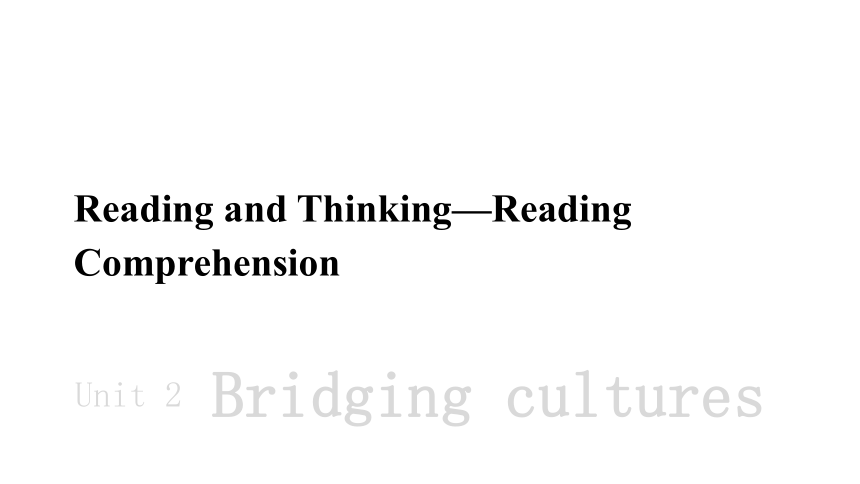 | |
| 格式 | pptx | ||
| 文件大小 | 5.6MB | ||
| 资源类型 | 教案 | ||
| 版本资源 | 人教版(2019) | ||
| 科目 | 英语 | ||
| 更新时间 | 2024-04-05 21:51:03 | ||
图片预览

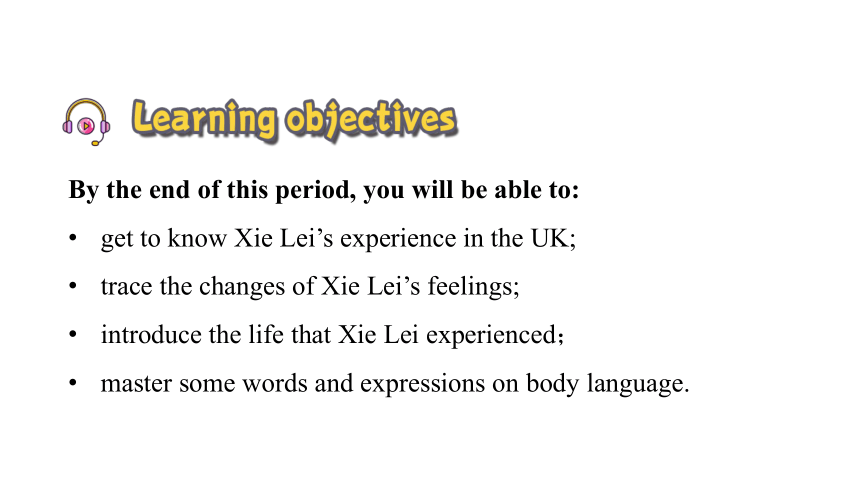
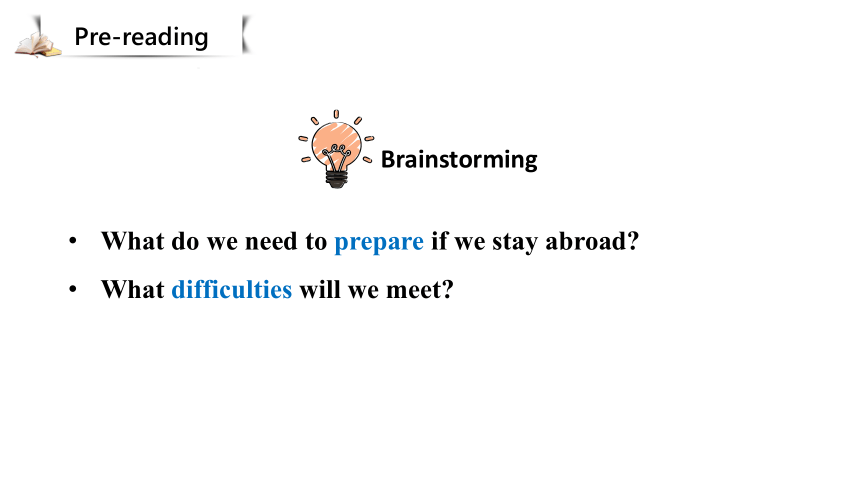
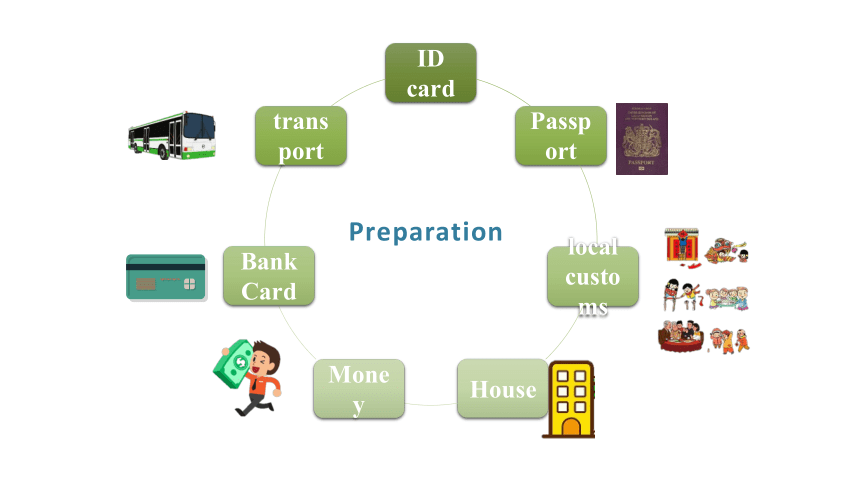
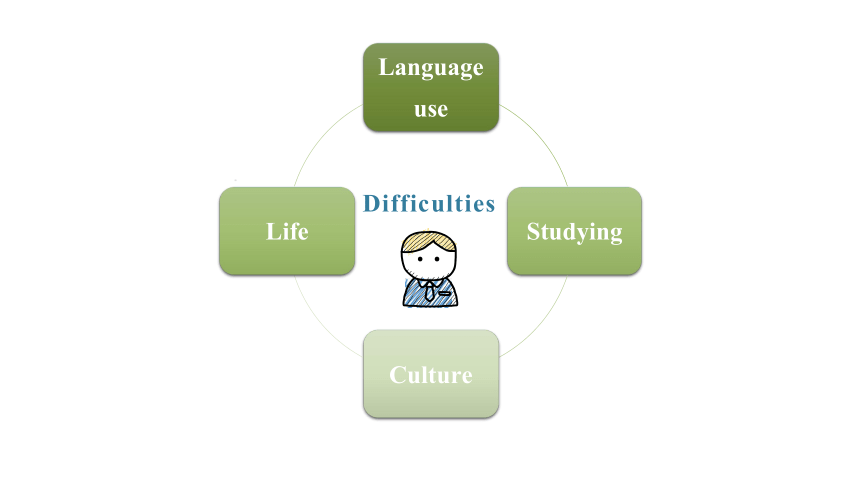
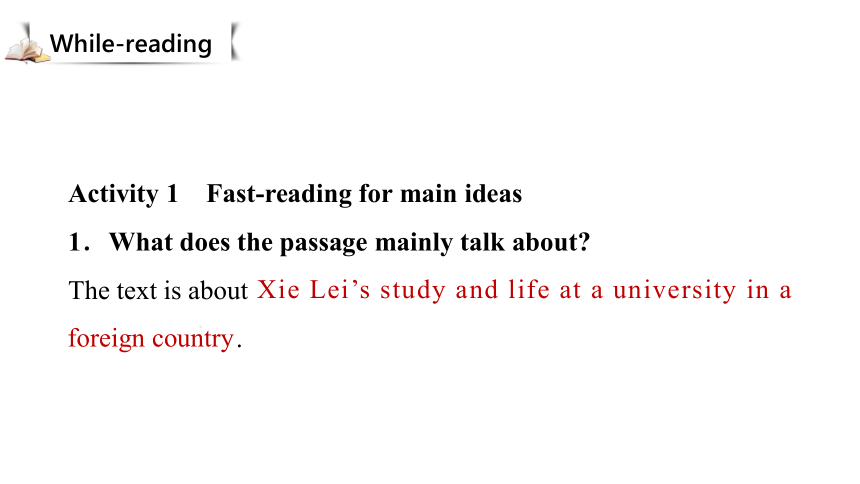
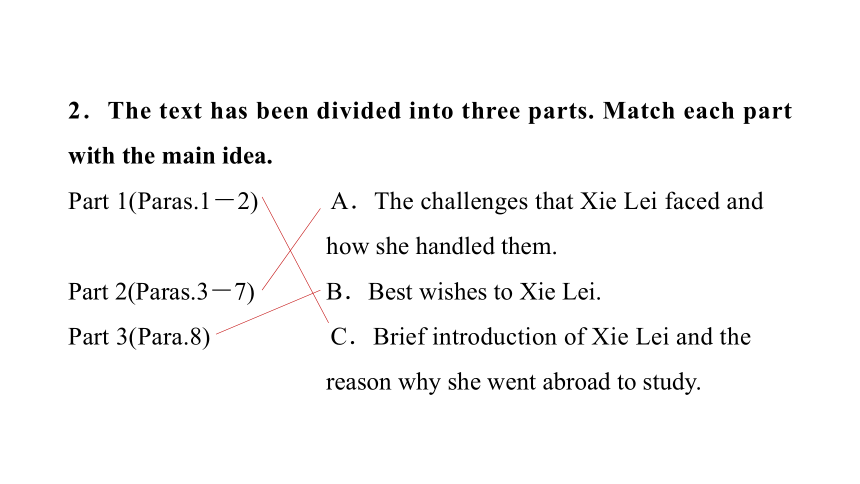
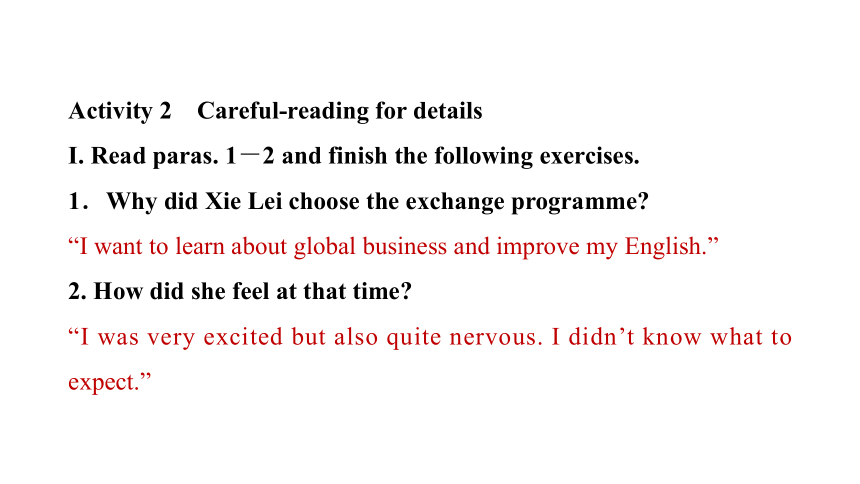
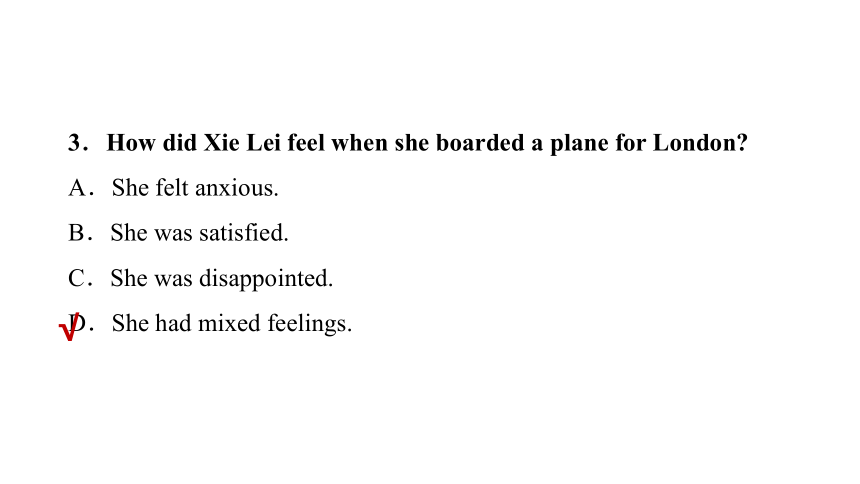
文档简介
(共28张PPT)
Unit 2
Bridging cultures
Reading and Thinking—Reading Comprehension
By the end of this period, you will be able to:
get to know Xie Lei’s experience in the UK;
trace the changes of Xie Lei’s feelings;
introduce the life that Xie Lei experienced;
master some words and expressions on body language.
Pre-reading
What do we need to prepare if we stay abroad
What difficulties will we meet
Brainstorming
Preparation
Difficulties
Activity 1 Fast-reading for main ideas
1.What does the passage mainly talk about
The text is about
.
Xie Lei’s study and life at a university in a foreign country
While-reading
2.The text has been divided into three parts. Match each part with the main idea.
Part 1(Paras.1-2) A.The challenges that Xie Lei faced and how she handled them.
Part 2(Paras.3-7) B.Best wishes to Xie Lei.
Part 3(Para.8) C.Brief introduction of Xie Lei and the reason why she went abroad to study.
Activity 2 Careful-reading for details
Ⅰ. Read paras. 1-2 and finish the following exercises.
1.Why did Xie Lei choose the exchange programme
“I want to learn about global business and improve my English.”
2. How did she feel at that time
“I was very excited but also quite nervous. I didn’t know what to expect.”
3.How did Xie Lei feel when she boarded a plane for London
A.She felt anxious.
B.She was satisfied.
C.She was disappointed.
D.She had mixed feelings.
√
4.What did Xie Lei have to learn at first
A.How to set up a business.
B.How to improve her English.
C.How to adapt to the new environment.
D.How to get along with her classmates.
√
Challenges What Xie Lei did
Daily life adaptation to a whole new life learn to _____________________;
learn to __________________________;
asked for ____________________;
loneliness lived with _____________
Academic requirements writing an essay got help from _________;
_____ a lot to prepare
participating in ______ and giving ____________ gave presentation on ___________________
Ⅱ. Read paras. 3-7 and do the following exercises.
traditional Chinese art
her tutor
read
class
presentation
a host family
use public transport
ask for things not knowing
help when got lost
1.What can we infer from the fourth paragraph
A.Xie Lei was not used to British food.
B.The host family cooked for Xie Lei every day.
C.Xie Lei got on well with the host family.
D.Xie Lei and Laura studied in the same university.
√
2.What does Xie Lei think her identity is
A.An honored visitor.
B.A cultural messenger.
C.A bridge builder.
D.A fluent translator.
√
Ⅲ. Read the text again and describe Xie Lei’s emotion line.
Time
Feelings
six months ago
at first
academic challenge
after a few weeks
live with a host family
halfway through
1 excited but nervous
2 lonely/helpless/homesick
3 confused
4 surprised & confident
5 comforted
6 feel at home
It was the first time that she had left china.
She didn’ t know what to expect.
She lived with a host family.
She did not know how to form her own opinions based on other people’ s ideas.
She found herself speaking up in class after just a few weeks and her presentation on traditional Chinese art was a great success.
What seemed strange before now appears quite normal to her.
She had to adapt to life in a different country.
Activity 1 Discussion
1. What other challenges do you think students studying abroad might face (Critical thinking)
One big challenge that many students have is the language—they may think they are good at English,but they are not used to hearing English being spoken at a normal speed, they are not used to English being spoken with a heavy accent, and they are not familiar with many English idioms. Another challenge may be coming to terms with the differences in a culture that is different to their own. Locals, however, will generally be understanding that the student is new to the country, and will appreciate attempts to learn and understand more about their culture. That is why it is best to be kind, respectful, and enthusiastic to try new things when in a foreign country—locals will be more willing to help new students and will be patient.
Post-reading
2. How do you think we should prepare to handle these challenges before going aboard (Creative thinking)
The best way to prepare is to try to immerse themselves in English before they go abroad. They should watch a variety of English-language films and TV programmes without using subtitles,listen to English songs,and use every opportunity to speak with native English speakers. It can also be scary to try to fit into the new lifestyle while there, since it is so different to their own. Maybe students will face times when they don’t understand the proper way to do something, such as paying utility bills. In this case, there is always someone who is willing to help — either at your university campus or even in a local shop.
What is Culture Shock 文化冲击
Culture shock is a condition that affects people who travel to a country different from their own. The term describes a traveler’s feelings of bewilderment when the environment and culture change from the one that he or she is familiar with. The unfamiliar surroundings, foreign language and strange habits of a new country can all contribute to a feeling of uneasiness and confusion.
Culture Shock U-Curve
Be a cultural messenger;
Break the barriers between different cultures;
Be more confident!
Face the difficulties in life!
Adapt to the new situation!
Challenge ourselves constantly!
Benefits
Difficulties
Activity 2 Summary
Fill in the following blanks with suitable words.
Six months ago,Xie Lei boarded a plane for London.It was the first time that she 1.________(leave) home.She went to a university to study for a business qualification and chose the exchange programme because she wanted to learn about 2.______(globe) business.She was 3._________(ambition) to set up a business after graduation.
had left
global
ambitious
At first,Xie Lei had to adapt to life in a different country.She chose to live with a host family,who can help with her 4.__________(adapt) to the new culture.When she missed home,she felt 5._________(comfort) to have a second family.Also Xie Lei had to satisfy academic requirements.Her tutor told her to acknowledge 6.____ other people had said if she cited their ideas,and advised her to read lots of information in order to form 7.___ wise opinion of her own.
Now halfway through her exchange year,Xie Lei feels much more at home in the UK.She said 8._________(engage) in British culture had helped and that she had 9._____________(involve) in social activities.She also said while learning about business,she was acting as a cultural messenger building a bridge 10._________ the two countries.
adaptation
comforted
what
a
engaging
been involved
between
Analyze the key points of the text
“WELCOME, XIE LEI!”
BUSINESS STUDENT BUILDING BRIDGES
Six months ago, 19-year-old Xie Lei said goodbye to her family and friends and boarded a plane for London. It was the first time that she had left China. “I was very excited but also quite nervous. I didn’t know what to expect,” Xie Lei recalled.
It was the first time that sb...这是某人第一次……
向……告别
上飞机
“疑问词+to do”作宾语
Paragraph 1
Xie Lei is studying for a business qualification at a university in China and has come to our university on a year-long exchange programme. "I chose the exchange programme because I wanted to learn about global business and improve my English. My ambition is to set up a business in China after graduation," she explained.
be to do 表示“将要,将来”
Paragraph 2
At first, Xie Lei had to adapt to life in a different country. “You have to get used to a whole new life,” she said. “I had to learn how to use public transport and how to ask for things I didn’t know the English names for. When I got lost, I had to ask passers-by for help, but people here speak fast and use words I’m not familiar with. I ask them to repeat themselves a lot!”
时间状语从句
习惯(于)……
“疑问词+to do” 作宾语
向……寻求帮助
省略了关系代词that/which的定语从句
Paragraph 3
Although some foreign students live in campus accommodation, Xie Lei chose to live with a host family, who can help with her adaptation to the new culture. “When I miss home, I feel comforted to have a second family,” Xie Lei said. “When there’s something I don’t know or understand, I can ask them. They are also keen to learn about China. Laura, the daughter of my host family, wants to study in China in the future. We take turns to cook each evening. They really love my stir-fried tomatoes and eggs! Laura says she always feels hungry when she smells it, so I taught her how to cook it, too.”
让步状语从句
选择做某事
who引导的非限制性定语从句
渴望做某事
又一;再一
轮流做某事
Paragraph 4
Another challenge for Xie Lei is the academic requirements. The first time that she had to write an essay, her tutor explained that she must acknowledge what other people had said if she cited their ideas, but that he mainly wanted to know what she thought! Xie Lei was confused because she thought she knew less than other people. Her tutor advised her to read lots of information in order to form a wise opinion of her own.
时间状语从句
宾语从句
建议某人做某事
条件状语从句
宾语从句
宾语从句
Paragraph 5
but为并列连词,后面的that从句为并列的宾语从句
Xie Lei also found many courses included students’ participation in class as part of the final result. Students need to generate ideas, offer examples, apply concepts,and raise questions, as well as give presentations. At first, Xie Lei had no idea what she should say, but what surprised her was that she found herself speaking up in class after just a few weeks. “My presentation on traditional Chinese art was a great success, which boosted my confidence.” she said. “I’ll use these skills back home for presentations,They’ll help me build a strong business in the future.”
主语从句
表语从句
Paragraph 6
Now halfway through her exchange year, Xie Lei feels much more at home in the UK. What seemed strange before now appears quite normal to her. “ Engaging in British culture has helped,” she said. “As well as studying hard, I’ve been involved in social activities. British people are fascinated by our culture and eager to learn more about it, so I’m keen to share my culture with them. While I’m learning about business. I’m also acting as a cultural messenger building a bridge between us.”
主语从句,作主语,有含义
参与,包括在内
渴望做某事
Paragraphs 7—8
We will follow Xie Lei’s progress in later editions, but for now, we wish her all the best.
Homework
Preview language points and recite the key points of the text.
Unit 2
Bridging cultures
Reading and Thinking—Reading Comprehension
By the end of this period, you will be able to:
get to know Xie Lei’s experience in the UK;
trace the changes of Xie Lei’s feelings;
introduce the life that Xie Lei experienced;
master some words and expressions on body language.
Pre-reading
What do we need to prepare if we stay abroad
What difficulties will we meet
Brainstorming
Preparation
Difficulties
Activity 1 Fast-reading for main ideas
1.What does the passage mainly talk about
The text is about
.
Xie Lei’s study and life at a university in a foreign country
While-reading
2.The text has been divided into three parts. Match each part with the main idea.
Part 1(Paras.1-2) A.The challenges that Xie Lei faced and how she handled them.
Part 2(Paras.3-7) B.Best wishes to Xie Lei.
Part 3(Para.8) C.Brief introduction of Xie Lei and the reason why she went abroad to study.
Activity 2 Careful-reading for details
Ⅰ. Read paras. 1-2 and finish the following exercises.
1.Why did Xie Lei choose the exchange programme
“I want to learn about global business and improve my English.”
2. How did she feel at that time
“I was very excited but also quite nervous. I didn’t know what to expect.”
3.How did Xie Lei feel when she boarded a plane for London
A.She felt anxious.
B.She was satisfied.
C.She was disappointed.
D.She had mixed feelings.
√
4.What did Xie Lei have to learn at first
A.How to set up a business.
B.How to improve her English.
C.How to adapt to the new environment.
D.How to get along with her classmates.
√
Challenges What Xie Lei did
Daily life adaptation to a whole new life learn to _____________________;
learn to __________________________;
asked for ____________________;
loneliness lived with _____________
Academic requirements writing an essay got help from _________;
_____ a lot to prepare
participating in ______ and giving ____________ gave presentation on ___________________
Ⅱ. Read paras. 3-7 and do the following exercises.
traditional Chinese art
her tutor
read
class
presentation
a host family
use public transport
ask for things not knowing
help when got lost
1.What can we infer from the fourth paragraph
A.Xie Lei was not used to British food.
B.The host family cooked for Xie Lei every day.
C.Xie Lei got on well with the host family.
D.Xie Lei and Laura studied in the same university.
√
2.What does Xie Lei think her identity is
A.An honored visitor.
B.A cultural messenger.
C.A bridge builder.
D.A fluent translator.
√
Ⅲ. Read the text again and describe Xie Lei’s emotion line.
Time
Feelings
six months ago
at first
academic challenge
after a few weeks
live with a host family
halfway through
1 excited but nervous
2 lonely/helpless/homesick
3 confused
4 surprised & confident
5 comforted
6 feel at home
It was the first time that she had left china.
She didn’ t know what to expect.
She lived with a host family.
She did not know how to form her own opinions based on other people’ s ideas.
She found herself speaking up in class after just a few weeks and her presentation on traditional Chinese art was a great success.
What seemed strange before now appears quite normal to her.
She had to adapt to life in a different country.
Activity 1 Discussion
1. What other challenges do you think students studying abroad might face (Critical thinking)
One big challenge that many students have is the language—they may think they are good at English,but they are not used to hearing English being spoken at a normal speed, they are not used to English being spoken with a heavy accent, and they are not familiar with many English idioms. Another challenge may be coming to terms with the differences in a culture that is different to their own. Locals, however, will generally be understanding that the student is new to the country, and will appreciate attempts to learn and understand more about their culture. That is why it is best to be kind, respectful, and enthusiastic to try new things when in a foreign country—locals will be more willing to help new students and will be patient.
Post-reading
2. How do you think we should prepare to handle these challenges before going aboard (Creative thinking)
The best way to prepare is to try to immerse themselves in English before they go abroad. They should watch a variety of English-language films and TV programmes without using subtitles,listen to English songs,and use every opportunity to speak with native English speakers. It can also be scary to try to fit into the new lifestyle while there, since it is so different to their own. Maybe students will face times when they don’t understand the proper way to do something, such as paying utility bills. In this case, there is always someone who is willing to help — either at your university campus or even in a local shop.
What is Culture Shock 文化冲击
Culture shock is a condition that affects people who travel to a country different from their own. The term describes a traveler’s feelings of bewilderment when the environment and culture change from the one that he or she is familiar with. The unfamiliar surroundings, foreign language and strange habits of a new country can all contribute to a feeling of uneasiness and confusion.
Culture Shock U-Curve
Be a cultural messenger;
Break the barriers between different cultures;
Be more confident!
Face the difficulties in life!
Adapt to the new situation!
Challenge ourselves constantly!
Benefits
Difficulties
Activity 2 Summary
Fill in the following blanks with suitable words.
Six months ago,Xie Lei boarded a plane for London.It was the first time that she 1.________(leave) home.She went to a university to study for a business qualification and chose the exchange programme because she wanted to learn about 2.______(globe) business.She was 3._________(ambition) to set up a business after graduation.
had left
global
ambitious
At first,Xie Lei had to adapt to life in a different country.She chose to live with a host family,who can help with her 4.__________(adapt) to the new culture.When she missed home,she felt 5._________(comfort) to have a second family.Also Xie Lei had to satisfy academic requirements.Her tutor told her to acknowledge 6.____ other people had said if she cited their ideas,and advised her to read lots of information in order to form 7.___ wise opinion of her own.
Now halfway through her exchange year,Xie Lei feels much more at home in the UK.She said 8._________(engage) in British culture had helped and that she had 9._____________(involve) in social activities.She also said while learning about business,she was acting as a cultural messenger building a bridge 10._________ the two countries.
adaptation
comforted
what
a
engaging
been involved
between
Analyze the key points of the text
“WELCOME, XIE LEI!”
BUSINESS STUDENT BUILDING BRIDGES
Six months ago, 19-year-old Xie Lei said goodbye to her family and friends and boarded a plane for London. It was the first time that she had left China. “I was very excited but also quite nervous. I didn’t know what to expect,” Xie Lei recalled.
It was the first time that sb...这是某人第一次……
向……告别
上飞机
“疑问词+to do”作宾语
Paragraph 1
Xie Lei is studying for a business qualification at a university in China and has come to our university on a year-long exchange programme. "I chose the exchange programme because I wanted to learn about global business and improve my English. My ambition is to set up a business in China after graduation," she explained.
be to do 表示“将要,将来”
Paragraph 2
At first, Xie Lei had to adapt to life in a different country. “You have to get used to a whole new life,” she said. “I had to learn how to use public transport and how to ask for things I didn’t know the English names for. When I got lost, I had to ask passers-by for help, but people here speak fast and use words I’m not familiar with. I ask them to repeat themselves a lot!”
时间状语从句
习惯(于)……
“疑问词+to do” 作宾语
向……寻求帮助
省略了关系代词that/which的定语从句
Paragraph 3
Although some foreign students live in campus accommodation, Xie Lei chose to live with a host family, who can help with her adaptation to the new culture. “When I miss home, I feel comforted to have a second family,” Xie Lei said. “When there’s something I don’t know or understand, I can ask them. They are also keen to learn about China. Laura, the daughter of my host family, wants to study in China in the future. We take turns to cook each evening. They really love my stir-fried tomatoes and eggs! Laura says she always feels hungry when she smells it, so I taught her how to cook it, too.”
让步状语从句
选择做某事
who引导的非限制性定语从句
渴望做某事
又一;再一
轮流做某事
Paragraph 4
Another challenge for Xie Lei is the academic requirements. The first time that she had to write an essay, her tutor explained that she must acknowledge what other people had said if she cited their ideas, but that he mainly wanted to know what she thought! Xie Lei was confused because she thought she knew less than other people. Her tutor advised her to read lots of information in order to form a wise opinion of her own.
时间状语从句
宾语从句
建议某人做某事
条件状语从句
宾语从句
宾语从句
Paragraph 5
but为并列连词,后面的that从句为并列的宾语从句
Xie Lei also found many courses included students’ participation in class as part of the final result. Students need to generate ideas, offer examples, apply concepts,and raise questions, as well as give presentations. At first, Xie Lei had no idea what she should say, but what surprised her was that she found herself speaking up in class after just a few weeks. “My presentation on traditional Chinese art was a great success, which boosted my confidence.” she said. “I’ll use these skills back home for presentations,They’ll help me build a strong business in the future.”
主语从句
表语从句
Paragraph 6
Now halfway through her exchange year, Xie Lei feels much more at home in the UK. What seemed strange before now appears quite normal to her. “ Engaging in British culture has helped,” she said. “As well as studying hard, I’ve been involved in social activities. British people are fascinated by our culture and eager to learn more about it, so I’m keen to share my culture with them. While I’m learning about business. I’m also acting as a cultural messenger building a bridge between us.”
主语从句,作主语,有含义
参与,包括在内
渴望做某事
Paragraphs 7—8
We will follow Xie Lei’s progress in later editions, but for now, we wish her all the best.
Homework
Preview language points and recite the key points of the text.
